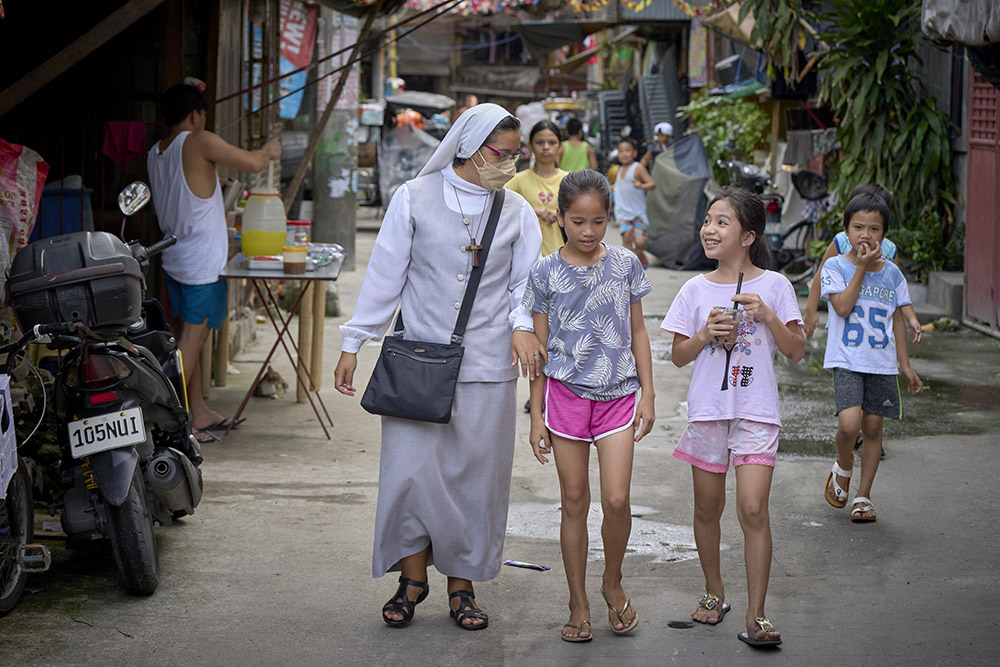
On the road to Emmaus, two of Jesus’s followers, distraught over the crucifixion and confused by reports of Jesus’ empty tomb, encounter the risen Christ but cannot recognize him. « How foolish you are, and slow to believe all that the prophets have spoken, » the Lord reprimands them, citing Scripture that foretold his death and resurrection.
It is only at table with them that evening, when Jesus took bread, blessed it, broke it and gave it to them that the scales fell from their eyes and they recognized him just before he disappeared from their sight.
« Did not our hearts burn within us when he talked to us on the road? » they asked themselves, as they set out for Jerusalem.
« Hearts on fire, feet on the move » is the theme Pope Francis chose for this year’s World Mission Month, which culminates Oct. 22, World Mission Sunday, the day Catholics publicly renew our commitment to the church’s missionary work.
Francis has called on us to show the light of God, not impose it; to act with humility that recognizes all people’s dignity as God-given and equal to our own; to proclaim the Gospel and share our faith by loving and supporting and showing compassion to all God’s children.
He has asked us to reflect on the church’s mission work during this month’s Synod of Bishops to recognize and redress our past mistakes; to comprehend how we can improve our missions to reveal God’s love; how we can encounter humanity in ways that reflect God’s light.
As he always tries to do, Francis preaches by example. Earlier this year, the church repudiated the « Doctrine of Discovery, » a series of mandates issued in the 15th century, papal bulls that legitimized the imperialistic oppression of Indigenous peoples and the theft of their lands.
The pope hasn’t shied from confessing the past sins of the church’s mission work, and asking forgiveness. He traveled to Canada in 2022 on a « Pilgrimage of Penance, » to apologize to Indigenous peoples for the church’s role in Canada’s residential school system. That system separated children from their families, denied them their language and traditions, and left them prey to the most iniquitous abuse.
With faith in God’s mercy, we must learn from our mistakes. We encounter sin daily. We must look to Christ for the light and love that allows us to navigate through and around it.
Contemporary evangelization is meeting people where they are and showing them the face of Christ, rather than commanding their devotion. Our mission work involves more than reciting Scripture or preaching with words. It’s helping people encounter Christ as Cleopas and Mary did on the road to Emmaus and seeing the light of his love. It’s helping them realize God’s love for them by being an example of his love for them.
I have seen the hold that kind of evangelization has on the human heart in my own missionary work in India. I have seen how encounters with Christ can repair the damage done by past sins, how it can transform the lives of sinners and the sinned against.
I met a woman there who had converted to Christianity. She told me how she had been forcibly married to an uncle at the age of 13. I asked her if she had married off her own daughters at such a young age. « No, father, they’re children of God, » she explained.
The work of Catholic missions is to help people encounter Christ by professing that all people, no matter their caste or religion, have intrinsic value. We are all children of God.
On World Mission Sunday, Catholics are asked to materially support the church’s mission. But that is not all that is expected of us. It is not the most that is expected of us. It is the least that is expected of us.
We are called to examine our consciences, to recognize and repent for our past sins. We are charged with asking ourselves how to go forth collectively and individually to shine God’s light in our communities. We are expected to engage in vital conversations in our congregations about how we can right old wrongs, alleviate the suffering of others, and regard them sincerely as our brothers and sisters by preaching with deeds as well as words of the Gospel that promises salvation.
Yes, to be a good Catholic requires more than material generosity. We must, as Francis shows us, possess a persistent humility that recognizes our dignity as equal to any other person’s but no more so, and act accordingly. We must profess a faith that encounters Christ on our own road and sets our heart afire.



